|
|
|
Sort Order |
|
|
|
Items / Page
|
|
|
|
|
|
|
| Srl | Item |
| 1 |
ID:
111866
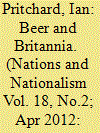

|
|
|
|
|
| Publication |
2012.
|
| Summary/Abstract |
Prior to industrialisation, there was a nebulous and fragmented Welsh national character or mass collective identity. Industrialisation engendered significant sociocultural upheaval and change, and for this 'new' society to function effectively a cohesive Welsh identity had to emerge. Because the impetus behind industrialisation had occurred primarily in a British context, any newly formed Welsh identity would ultimately have to be reconciled to the nation's industrial import within a 'United Kingdom'. Mass cultural commonalities and the role played by leisure in this procedure is a core element in the establishment of industrial modernist nation-states. Therefore, this article argues that public-house culture played a central role in the construction of a new industrial Welsh national ideology that was ultimately allied to, and a constituent of, a British imperial agenda designed to exploit both the natural resources and workforce of the area to its maximum extent.
|
|
|
|
|
|
|
|
|
|
|
|
|
|
|
|
| 2 |
ID:
111861
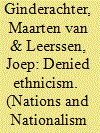

|
|
|
|
|
| Publication |
2012.
|
| Summary/Abstract |
The Walloon movement is the lesser-known counterpart to the Flemish movement in Belgium. In contemporary political debate it presents itself, and is usually perceived, as a civic and voluntaristic movement predicated on the values of democracy, freedom, openness and anti-nationalism. As such it is contrasted against its Flemish counterpart, which accordingly is characterised as tending towards an ethnic exclusivist form of nationalism hinging on descent, culture and language. However, the historical record behind these representations shows that the Walloon movement is rooted in ethno-cultural as much as social politics, and that it has always contained both civic and ethnic elements to varying degrees. This article highlights the Walloon movement in order to analyse the language and national stereotypes in which national movements are characterised both in political rhetoric and in scholarly analysis. The case is particularly relevant for the problematic usage of the 'civic-ethnic' opposition, slipping between the discourses of antagonism and analysis; one type of such slippage is here identified as 'denied ethnicism'.
|
|
|
|
|
|
|
|
|
|
|
|
|
|
|
|
| 3 |
ID:
111863
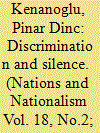

|
|
|
|
|
| Publication |
2012.
|
| Summary/Abstract |
In 1974, the dispute between Turkey and Greece over Cyprus resulted in Turkish military intervention in the island. The same year, the Turkish Court of Cassation issued a legal decision that rendered possible the confiscation of properties belonging to minority foundations in the years to come. I argue that the case of minority foundations in 1974 was not a coincidence but a conscious reciprocal discrimination applied in both official and unofficial spheres. I support my argument with the following indicators: (1) the wider historical Greek-Turkish conflict and its 'reciprocal' nature of discrimination against non-Muslim minorities; (2) the laden interpretation of the non-Muslim minorities as the internal enemies in the Turkish mind-set and its direct reflections on the 1974 case of foundations; and (3) the nature of the press coverage, which I assess using detailed reading and content analysis of three Turkish newspapers (Hürriyet, Tercüman, Cumhuriyet) and one Rum minority newspaper (Apoyevmatini).
|
|
|
|
|
|
|
|
|
|
|
|
|
|
|
|
| 4 |
ID:
111867
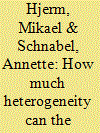

|
|
|
|
|
| Publication |
2012.
|
| Summary/Abstract |
Cultural and economic heterogeneity is often seen as a major threat to modern welfare states. This article contributes to the discussion of how much heterogeneity the welfare state can endure by theoretically and empirically focusing on the relationship between different levels of national identity and the support for welfare state policies. We analyse the effect of different types of national identity on attitudes towards taxation and redistribution. We show that it is the subjective aspect of national identity, or social cohesion, that in fact matters for predicting attitudes to the welfare state. In comparison, more objective measures of heterogeneity like the inequality of income distribution, language fractionalisation or the percentage of foreign-born individuals do not have any effect on attitudes to the welfare state.
|
|
|
|
|
|
|
|
|
|
|
|
|
|
|
|
| 5 |
ID:
111860


|
|
|
|
|
| Publication |
2012.
|
| Summary/Abstract |
New nationalism differs from classical nationalism in terms of its content and focus. Whereas classical nationalism distinguishes itself from other nation-states in defining its national identity, new nationalism distinguishes the 'native' national identity from that of its current and prospective citizens of migrant origin. The terms of integration thus become conditions of membership in the national community. Citizenship and integration policies emerge as central arenas where the discourse of new nationalism unfolds. This study looks into the discourses of cultural citizenship by studying the content of the official 'citizenship packages' - materials designed to welcome newcomers and assist them in their integration - in three Western European countries: The Netherlands, France and the UK. What images are depicted of the nation-state and the migrant in citizenship packages, and (how) do these images freeze the nation?
|
|
|
|
|
|
|
|
|
|
|
|
|
|
|
|
| 6 |
ID:
111862
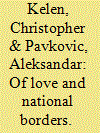

|
|
|
|
|
| Publication |
2012.
|
| Summary/Abstract |
Croatia became a UN member only in 1992, after the violent break-up of Yugoslavia. Its anthem is marked by historically founded ambivalences as to the nature and territorial extent of the nation in question. This article offers an interpretation of the current version of the anthem and an analysis of the narrative and imagery of the nineteenth-century poem from which the anthem originates. Three of the anthem's four stanzas speak about the Croats' love for their homeland and their people and of the steadfastness and immortality of their love; the remaining stanza extolls the beauty of the homeland. By addressing the homeland's rivers and the sea directly, its singers appropriate this geography and so demarcate the borders of their much-loved homeland. The anthem thus asserts Croatia's unity (against potential pretenders) and its unbreakable ties with its people. In contrast, the original fourteen-stanza poem 'The Croatian Homeland', written in 1835, is a paean to the Croats' ties to nature, their simple life and bravery - the romantic virtues of pure national souls. On their path to anthemhood, the four stanzas drawn from this poem have undergone significant modifications and additions, the result being a song that is doubly reassuring: it reassures the singers first of the people's love for themselves as a people, and second that this love is the means by which the 'natural' territory of the homeland is maintained.
|
|
|
|
|
|
|
|
|
|
|
|
|
|
|
|
| 7 |
ID:
111865


|
|
|
|
|
| Publication |
2012.
|
| Summary/Abstract |
Nepal's adoption of a new national anthem in 2007 reflected a decision to establish a new social and political order that was republican, federal and inclusive of the country's many minority communities. It came after a ten-year internal conflict, and was followed by the abolition of the Shah monarchy that had ruled the country since the late eighteenth century. This article describes the historical and political context of the decision to replace the old anthem, the selection of the new anthem, and the debates that arose in the Nepali media and public sphere after its lyrics and the identity of its author were made known. The discussion refers to arguments made by Karen Cerulo about the relationship between the syntactic structure of national anthems and the stage reached in the process of political modernisation of the nation-state in question, and provides some comparative perspectives on the Nepali case.
|
|
|
|
|
|
|
|
|
|
|
|
|
|
|
|
| 8 |
ID:
111864
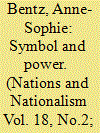

|
|
|
|
|
| Publication |
2012.
|
| Summary/Abstract |
This article originated in a brief but inspiring analysis by Margaret Nowak. Nowak used Sherry Ortner's concept of 'summarising symbol' to imply that, much the same way as the American flag was the epitome of the United States to each and every American, the Dalai Lama encompasses everything Tibetan to the Tibetan people. What does this comparison say about the Dalai Lama? I examine the relationship between symbol, power and charisma with Tenzin Gyatso, the current Dalai Lama, as a case in point. With exile, there has been a shift in the symbolic importance of the Dalai Lama, both as a man and as an institution, from a symbol of Tibet and Tibetan Buddhism to a symbol of the Tibetan cause and, more generally, to a symbol of Buddhism in the world. These changes have given Tenzin Gyatso a new authority in the Tibetan community: he is now the unique and unquestioned leader of the Tibetan cause in the world. I discuss the problems that occur when a symbol is also a man and a leader, as well as the solutions proposed, at a moment when the Tibetan community in exile is experiencing democratisation.
|
|
|
|
|
|
|
|
|
|
|
|
|
|
|
|
| 9 |
ID:
111859


|
|
|
|
|
| Publication |
2012.
|
| Summary/Abstract |
Through the prism of current state discourses in Ireland on engagement with the Irish diaspora, this article examines the empirical merit of the related concepts of 'diaspora' and 'transnationalism'. Drawing on recent research on how Irish identity is articulated and negotiated by Irish people in England, this study suggests a worked distinction between the concepts of 'diaspora' and 'transnationalism'. Two separate discourses of authenticity are compared and contrasted: they rest on a conceptualisation of Irish identity as transnational and diasporic, respectively. I argue that knowledge of contemporary Ireland is constructed as sufficiently important that claims on diasporic Irishness are constrained by the discourse of authentic Irishness as transnational. I discuss how this affects the identity claims of second-generation Irish people, the relationship between conceptualisations of Irishness as diasporic within Ireland and 'lived' diasporic Irish identities, and implications for state discourses of diaspora engagement.
|
|
|
|
|
|
|
|
|
|
|
|
|
|
|
|
|
|
|
|
|